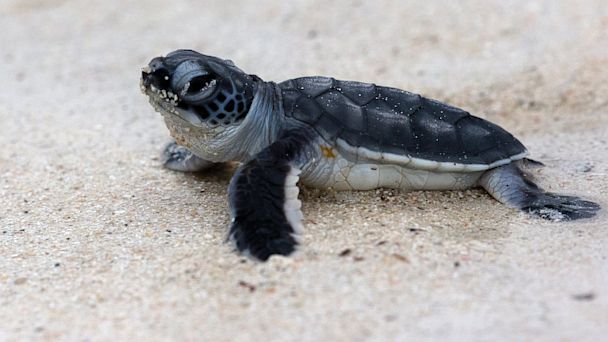Sea Turtles Disoriented on Florida Island

Getty Images
At least six female sea turtles have become disoriented this summer on Anna Maria Island in Florida, unable to find their way back to the water after coming to shore to nest.
Suzi Fox, the director of the Anna Maria Island Turtle Watch, told ABC News the turtles have been found under rocks, on roads, and in pathways. There was even one stuck under a beach chair, she said.
"They climb up two-foot rock spaces or up pathways, [and] they mentally become disoriented about which way is back to the sea because they can't turn their way from side to side," Fox said. "They are crawling around for a couple of hours."
It is typical for female sea turtles to come ashore to nest, Fox said. But generally they head straight back to the water. It is unusual for them to have trouble finding their way back to sea.
She said her staff at the conservancy often had to help lead them back to shore, which is not an easy task when dealing with animals that according to the Sea Turtle Conservancy, can weigh as much as 1,300 pounds.
Fox says 256 female turtles have come ashore to nest this summer, meaning that only a small percentage have actually become disoriented. Still, that is already three times as many as she saw in the past 15 years combined.
"Why I have had six this year has been in a mystery," she said.
Although she does not know for certain, she said the disorientation might be connected to how the shoreline receded after Tropical Storm Gabby last year. She also said the Department for Environmental Protection is building a parking lot and a deck on the beach. Consequently, the turtles have lost land to make their nests, which becomes inherently confusing for them.
"What they have been coming up and nesting in the last 10 years is gone," Fox said. "The more habitat there is, the more nests they can create."
There are plans to replenish the shore, but they will take a while to implement, she said.
However, Fox said these incidents have not posed a threat to humans. Turtles do not want to be around people, and just want to get back to the water as quickly as possible - if they can find their way, she said.
But David Godfrey, the executive director of the Sea Turtle Conservancy, told ABC News that disorientation can pose a threat to turtles, which are classified as either endangered or threatened under the endangered species act.
"The state of Florida hosts 90 percent of sea turtle nesting in the united states," Godfrey said. "What happens on the beaches is vital to our sea turtle population."